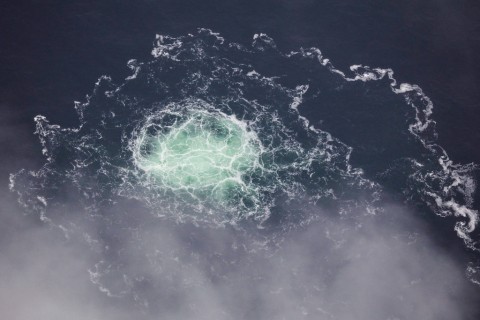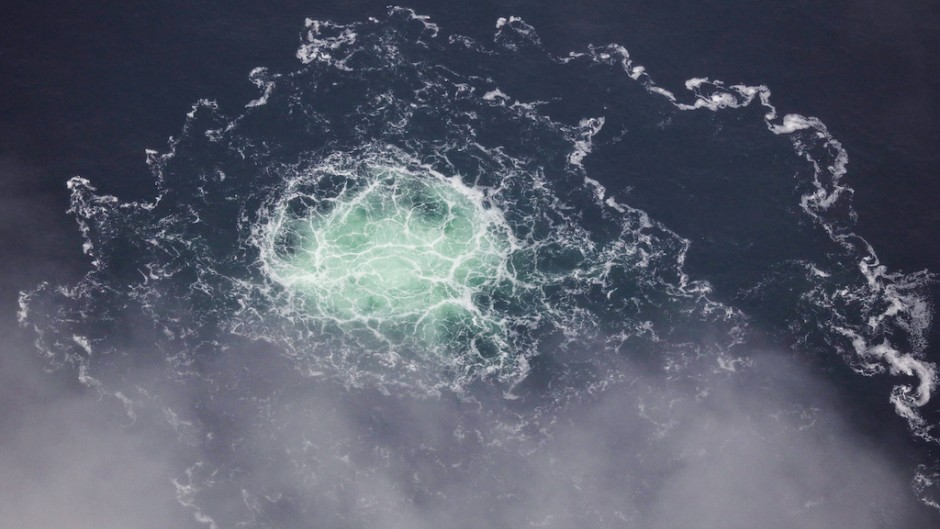
BERLIN - Built to carry Russian gas to Germany, the Nord Stream pipelines have been mired in controversy even before Russia's invasion of Ukraine.
Nord Stream 2, the newer of the two ducts, was never put into operation as Berlin pulled the plug on it days before Moscow's troops entered Ukraine on February 24, 2022.
Nord Stream 1, which had been a main conduit carrying gas to Germany in recent years, was mothballed when Russian energy giant Gazprom suspended supplies last August.
But the pipelines sprung back into the headlines when huge leaks were uncovered in September, with both the West and Russia calling it sabotage.
Almost six months later, here is what we know so far about the mysterious explosions:
- What happened? -
Four leaks emerged on the two Nord Stream pipelines in the Baltic Sea off the coast of the Danish island of Bornholm at the end of September, with seismic institutes reporting that they had recorded two underwater explosions prior to the leaks appearing.
The pipelines, it turned out, were ruptured by subsea explosives, seven months after Russian forces invaded Ukraine.
While the leaks were in international waters, two of them were in the Danish exclusive economic zone and two in the Swedish one.
The incident was all the more unusual as the pipelines are located in a closely monitored area with a multitude of military ships with significant intelligence techniques patrolling.
In the immediate aftermath of the explosions, Russia directly accused the United States and Britain of carrying out the blasts.
US President Joe Biden has described the Russian allegations as "disinformation and lies".
Like other Western leaders, Biden has called the explosions "a deliberate act of sabotage" and vowed to work with allies to find out what happened.
Britain has called Russia's allegations "false claims on an epic scale".
Germany, Sweden and Denmark have since been investigating the case.
- What has emerged from news reports? -
In February, veteran US investigative journalist Seymour Hersh said the US was behind the blasts and that Norway had assisted.
The White House dismissed Hersh's report, which cited an unnamed source, as "complete fiction". Oslo has also rejected the allegations as false.
On Tuesday, the New York Times reported that US officials had seen new intelligence indicating that a "pro-Ukrainian group" was responsible for the sabotage.
The NYT article said US officials had no evidence implicating Ukrainian President Volodymyr Zelensky in the pipeline bombing, and it did not identify the source of the intelligence or the group involved.
Separately, German media reports published late Tuesday said German investigators believed that the unidentified group was made up of five men and one woman using professionally falsified passports.
According to the German reports, a yacht was used in the incident and was rented out by a company based in Poland, belonging to two Ukrainians.
- What do investigators say? -
German federal prosecutors confirmed they raided a vessel in January, and had seized objects and uncovered traces from the ship.
Their search was carried out over the "suspicion that the ship in question could have been used to transport explosive devices that exploded on 26 September 2022 at the Nord Stream 1 and Nord Stream 2 gas pipelines in the Baltic Sea", they said.
The prosecutors said however that no firm conclusion could be drawn as yet on the perpetrators of the incident, their motives or on whether it was state-orchestrated.
- What do analysts say? -
The sabotage constituted a form of hybrid warfare, say some analysts, which can take place outside a classic military setting.
"Hybrid warfare is by definition about unattributed or ambiguous and shady acts. More evidence is likely to emerge," said a Western expert who declined to be named.
Professor Veli-Pekka Tynkkynen of Helsinki University noted that the "fact there was so little evidence shows it must have been done by a state actor" as it requires "skills that only military organisations have".
He believed that Russia had the most to gain from the blasts as it "increases fear and raises the bar for Europe to provide aid to Ukraine".
In contrast, Ukraine -- be it official or not -- stood to lose political support by carrying out such an act.
A French observer speaking on condition of anonymity said he believed "we will never know what happened".
"One of the two camps knows that it didn't do it and that the other has sent it a message."

